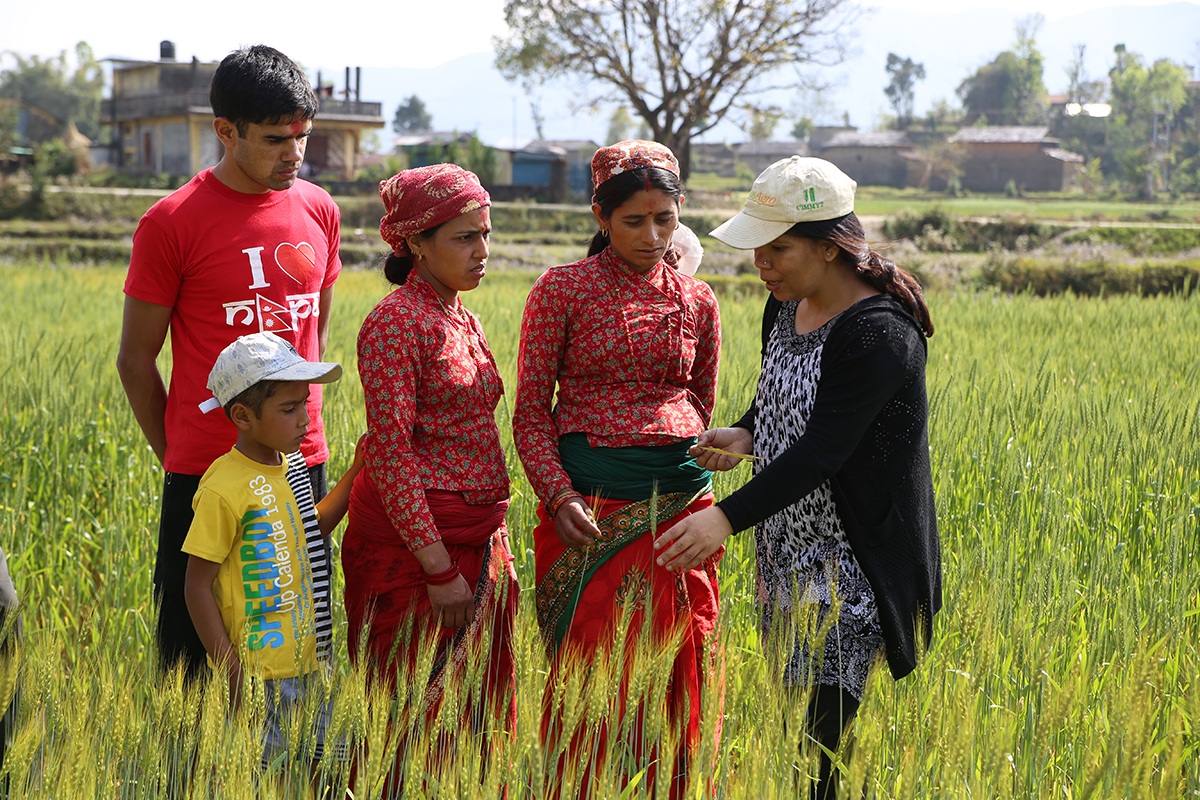Programs empower women farmers around the world
By Samantha Hautea

On Oct. 15, the International Day of Rural Women, the United Nations recognizes the critical role and contribution of rural women, including indigenous women, in enhancing agricultural and rural development, improving food security and eradicating rural poverty.
“Empowering rural women is a key component of international agricultural and rural development,” said Ronnie Coffman, director of International Programs in the College of Agriculture and Life Sciences (IP-CALS). “There is a growing recognition that successfully achieving the U.N.’s Sustainable Development Goals – indeed, any meaningful change in the health and well-being of a country’s population – requires an understanding of the needs of rural women and how to ensure their participation.”
Region, history and culture play a part in shaping gender relationships, which are often highly complex and rarely well understood. Yet these same relationships can have a profound impact on access to resources, decision-making, and technology adoption in communities, Coffman said.
According to the Food and Agriculture Organization of the United Nations, giving women farmers equal access to training, financing, knowledge and support could increase their productivity by 20 to 30 percent. Greater productivity and dependable harvests mean more food for their families, stable income and better opportunities for their children.
In IP-CALS, faculty and students working on multiple projects recognize the importance of involving rural women and other female stakeholders in research and training, and work to deliver benefits to women as well as men. A few examples:
Incorporating gender sensitivity in agricultural research
Gender-responsive Researchers Equipped for Agricultural Transformation (GREAT) seeks to improve outcomes for all farmers in sub-Saharan Africa by increasing gender equality and participation in agricultural research. In September 2016, GREAT launched its first gender-responsiveness training course for researchers working on root, tuber and banana breeding projects in Africa. The cohort consisted of 18 trainers and 33 researchers from 11 countries.
Course participants learned concepts of gender-responsiveness in research, and will work over the next several months to apply these concepts to ongoing research and analyze and interpret data with a gender-sensitive lens. A follow-up training session will take place in February 2017.
“Our goal is for agricultural practitioners and scientists working across sub-Saharan Africa to improve the productivity, nutrition and livelihoods of smallholder farmers by bringing gender responsiveness to their work,” said Hale Ann Tufan, who leads the GREAT project team at IP-CALS.
GREAT is a collaboration between Cornell and Makerere University in Kampala, Uganda. Upcoming GREAT trainings will focus on gender responsiveness in grains, animal breeding, dairy value chains, legumes, nutrition and food systems, extension, and mechanization in Africa.
New varieties of cassava
The Next Generation Cassava Breeding (NEXTGEN Cassava) project aims to improve cassava production for farmers and communities in Africa, where cassava is a staple crop central to food security and community health.
One of the challenges facing NEXTGEN is to ensure that farmers adopt new cassava varieties when they are developed. Men and women usually prefer different traits in the crops they consume and grow, and researchers must keep these preferences in mind as they develop new varieties.
“Women need varieties that will suit their various purposes and needs,” said Chiedozie Egesi, project manager for NEXTGEN. “Our project ensures that while we use innovative state-of-the-art technologies to breed for better cassava varieties, we capture and include their interests and preferences in our breeding decisions.”
“We have no bank account, the cassava stored up in the ground is our bank,” said female cassava farmer Ngozi Obi, for whom storability is a key trait, during a recent NEXTGEN focus group discussion.
Participatory variety selection in wheat
Delivering Genetic Gain in Wheat (DGGW), a new phase of the 2008-16 Durable Rust Resistance in Wheat (DRRW) project, addresses the challenges of climate change and diseases – including rust – that impact wheat production in developing countries.
“In countries like Ethiopia and Nepal, where most of the farmers are women, using some form of participatory variety selection and a gender lens is extremely important in improved variety adoption,” said Coffman, vice-chair of the Borlaug Global Rust Initiative and DGGW primary investigator.
Maricelis Acevedo, associate director of science for the DGGW project, says, “It is a huge inefficiency if farmers do not take up new varieties that are disease resistant when they are developed because using older yellow or stem rust-susceptible varieties puts whole communities at risk. Women farmers must benefit from investments in research as much as male farmers. As researchers, we need to take into account women’s input because there are lots of interesting differences between the trait qualities that men and women farmers want in improved varieties.”
DGGW has a talent pipeline that invests in both men and women researchers from developing countries, particularly those from rural areas who may have a farming background, says Acevedo. She noted that, of the 34 women researchers who have benefitted from the DRRW’s Early Career Women in Triticum Awards, many are from rural backgrounds.
GREAT, NEXTGEN and the DGGW are funded by the Bill & Melinda Gates Foundation. NEXTGEN and DRRW are also funded by the U.K. Department for International Development.
Samantha Hautea is a communications specialist with International Programs.
Media Contact
Get Cornell news delivered right to your inbox.
Subscribe